
Lysine is one of the most important parts your body needs for health, growth, and repair. As an essential amino acid, it helps build strong muscles and bones. It also keeps your skin healthy, supports your immune system, and helps you recover faster after you get sick or exercise. If you want to get more from your diet, stop any lack of lysine, or reach your health goals, learning more about L-lysine can really help. In this guide, you will find the top science-backed benefits of lysine, the best foods that have it, how it helps your body, and smart tips to use it safely.
Introduction: What Is L Lysine?
Lysine is an essential amino acid that is important for making proteins and forming collagen. It helps the body absorb calcium, which is good for bone health. Lysine also assists in the production of enzymes, antibodies, and hormones. You can find out more about this important nutrient.
L Lysine Benefits: Health, Immunity, Skin & More
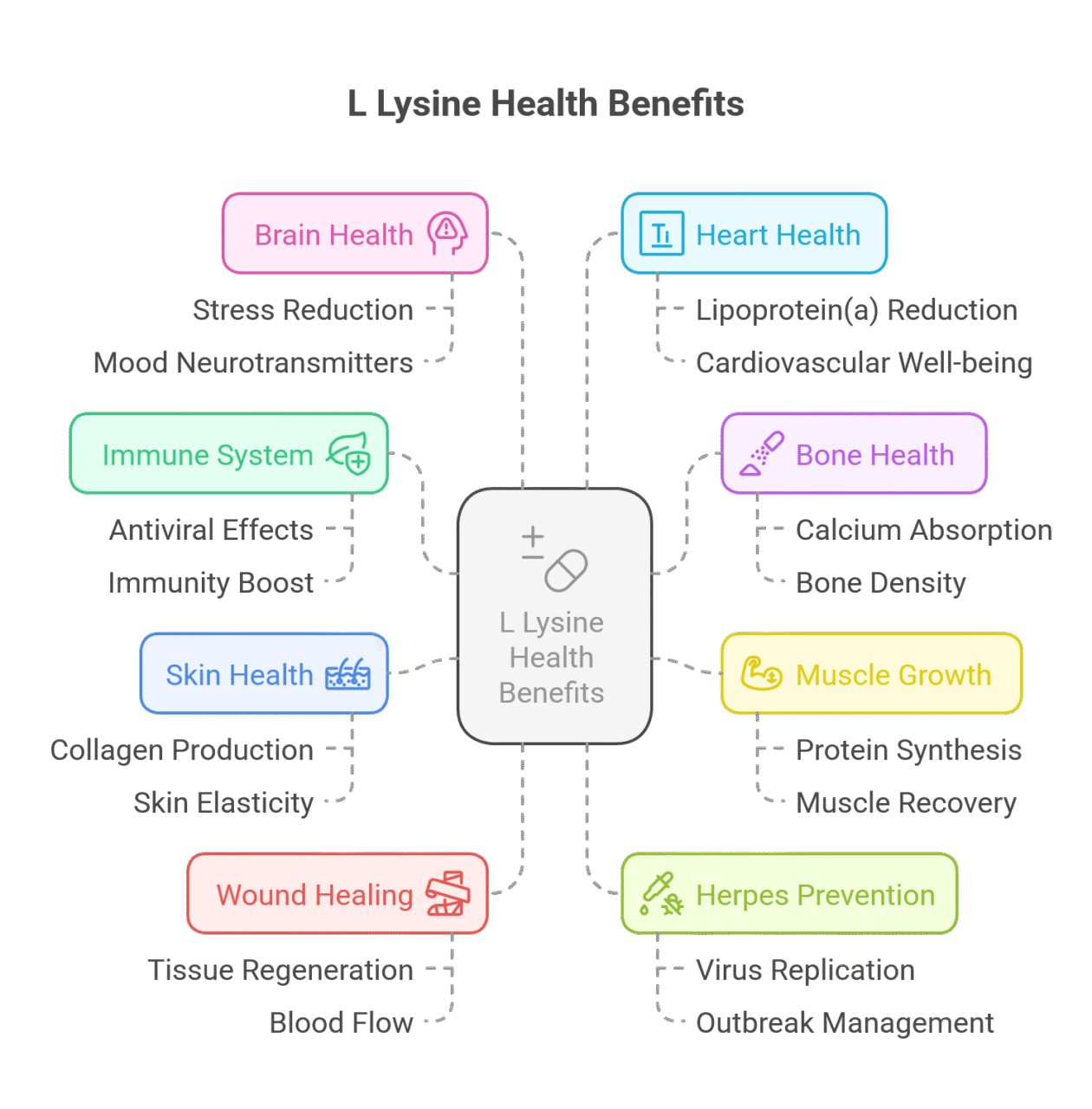
Lysine is a vital amino acid with health benefits for the human body. It aids heart health by lowering lipoprotein(a) levels. Lysine assists in calcium absorption for strong bones. Moreover, it helps produce collagen for healthy skin and tissues. Studies suggest it can combat herpes simplex effectively. Lysine supplements may aid weight management by supporting lean body mass. Boosting the immune system, lysine promotes overall health.
How L Lysine Supports Immune System & Fights Viruses
A healthy immune system is crucial for fighting infections. L-lysine may boost immunity. Research suggests L-lysine could have antiviral effects, especially against herpes simplex virus (HSV). Studies discuss using lysine to manage herpes outbreaks, reducing their frequency and severity. While not a cure, lysine supplements may help manage the virus naturally. Before trying any new supplement, consult a healthcare professional for safety and proper dosage guidance.
L Lysine for Calcium Absorption & Bone Health
Calcium is vital for strong bones. L-lysine helps the body use calcium better. Research suggests it aids calcium absorption in the gut, potentially boosting bone health over time. Adequate calcium intake is crucial to prevent bone loss and osteoporosis risk. While dairy offers calcium, incorporating L-lysine-rich foods or supplements (under medical guidance) can enhance bone health. Further research, including clinical studies, is required to grasp L-lysine’s impact on bone density but initial findings support its role in maintaining robust bones as we age.
L Lysine for Muscle Growth, Recovery & Performance
L-lysine is a vital amino acid for tissue repair and muscle building. It aids in protein synthesis, crucial for athletes and injury recovery. Athletes benefit as this tablet speeds muscle healing post-workout, reducing soreness and enhancing performance. Consuming L-lysine-rich foods or supplements can aid active individuals, but consult a healthcare provider first.
L Lysine for Skin Health & Collagen Production
Collagen is vital for our skin, keeping it firm, elastic, and youthful. L-lysine aids in collagen production, an essential building block for healthy skin. This amino acid not only supports collagen but also helps maintain tendons and cartilage. These tissues offer body support and strength. Consuming L-lysine-rich foods or supplements (under medical guidance) can promote healthy aging, skin elasticity, and strong connective tissues.
L Lysine for Wound Healing & Tissue Repair
Our skin protects us from harm. It can get cuts and burns. L-lysine helps in healing wounds, including diabetic foot ulcers. Studies suggest it speeds up healing and repairs tissue by supporting collagen production. Collagen is crucial for tissue regeneration. Adequate L-lysine boosts collagen production, aiding in good healing. Research indicates L-lysine may promote new blood vessel formation, improving blood flow to injured areas for faster recovery. Though more studies are needed, L-lysine seems promising for natural healing support.
L Lysine for Herpes & Cold Sores Prevention
Herpes virus infections like cold sores and the treatment of genital herpes are common and can be painful. L-lysine may help manage these outbreaks by potentially blocking the virus from replicating itself. More research is needed to confirm its effectiveness. L-lysine might work by hindering another amino acid that the virus needs to multiply. If you frequently experience herpes outbreaks, consult your healthcare provider for guidance on L-lysine supplementation. They can assess if it’s suitable for you, recommend the correct dosage, and provide advice based on your health and circumstances.
L Lysine for Brain Health, Stress & Anxiety
Emerging studies suggest L-lysine benefits physical and brain health. Animal research hints it affects stress and anxiety. Human studies are needed for confirmation. Initial research on anxiety shows positive results. L-lysine may influence mood neurotransmitters. More research is necessary to grasp its impact on mental health and mood disorders. Consult a healthcare provider before using L-lysine for stress or mental health concerns.
L Lysine for Heart Health & Lowering Lipoprotein(a)
L Lysine is vital for heart health. It may lower lipoprotein(a) levels, reducing heart disease risk. Research suggests lysine can decrease these levels when consumed. You can get L Lysine from food or supplements to enhance heart health and lipid levels. This amino acid is crucial for cardiovascular and heart well-being, so think about adding it for a healthier heart.
L Lysine Foods: Best Animal & Plant-Based Sources
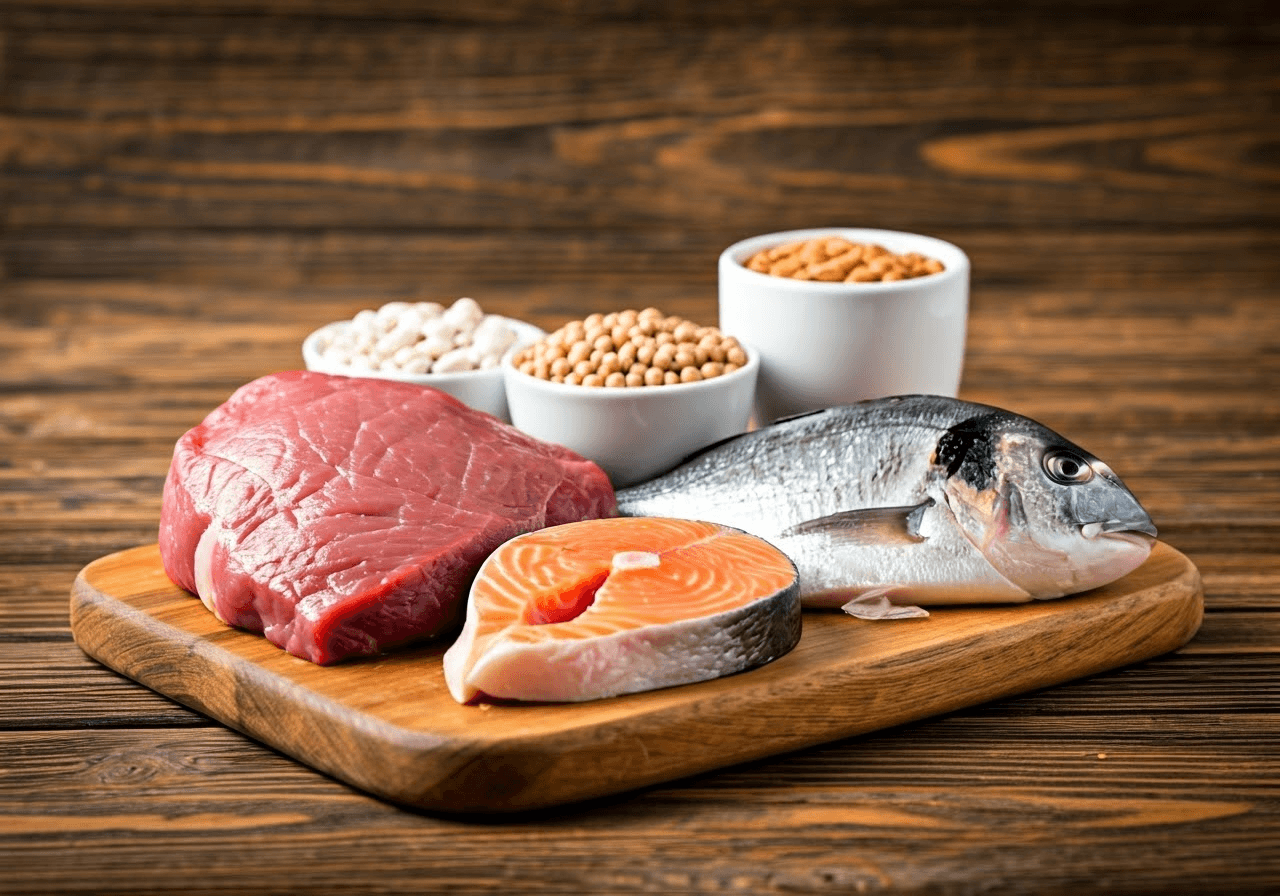
Legumes such as chickpeas, lentils, and beans provide lysine. Beef, poultry, and eggs also contain this amino acid. Dairy products like cheese, yogurt, and milk are good sources of lysine as well. For a plant-based diet, include legumes and soy products for lysine. Combining these foods can fulfill your lysine requirements effectively.
Top Animal-Based L Lysine Sources
Animal products are some of the best sources of L-lysine. If you eat these foods, they can be great for your diet. Eating a mix of these protein sources can help you get enough L-lysine each day.
Here are some good options:
Lean meats: Chicken, beef, turkey, and pork are all great sources of L-lysine. Each serving gives you a lot of this important nutrient.
Fish and seafood: Salmon, tuna, cod, and shellfish like shrimp and mussels not only have plenty of protein but also offer a good amount of L-lysine.
Dairy products: Milk, cheese, and yogurt are valuable sources of L-lysine. This is especially true if you include dairy in your diet.
If you’re not sure you are getting enough L-lysine from your diet, talk to your doctor or a registered dietitian. They can help you understand your needs and suggest if you need any dietary supplements.
Below is a quick comparison of top animal-based foods highest in L-lysine, along with their additional health benefits and tips for everyday use:
| Food Source | Approx. Lysine Content (per 100g cooked) | Other Notable Nutrients / Benefits | Tips for Consumption / Considerations |
|---|---|---|---|
| Cheese (Parmesan, Swiss) | ~3.0 g | Protein, calcium, vitamin A (retinol), vitamin B12 (cobalamin) | Very high in lysine. Watch for sodium content. |
| Chicken Breast | ~2.9 g | Protein, vitamin B6 (pyridoxine), niacin (vitamin B3), selenium | Lean, versatile, low fat. Grill or bake for best results. |
| Lean Beef (Top Round, Sirloin) | ~2.8 g | Protein, iron, zinc, vitamin B12 (cobalamin), creatine | Choose lean cuts. Grill, roast, or stew. |
| Turkey Breast | ~2.6 g | Protein, B vitamins (including vitamin B3 niacin, vitamin B6 pyridoxine, vitamin B12 cobalamin), selenium | Great for low-fat, high-protein diets. |
| Pork (Lean Cuts) | ~2.5 g | Protein, thiamine (vitamin B1), vitamin B6 (pyridoxine), zinc | Lean pork is rich in lysine and B vitamins. |
| Duck (Dark Meat) | ~2.5 g | Protein, B vitamins (including vitamin B2 riboflavin, vitamin B3 niacin, vitamin B6 pyridoxine), selenium | Higher fat, flavorful. Eat in moderation. |
| Lamb (Lean) | ~2.4 g | Protein, iron, vitamin B12 (cobalamin), zinc | Rich flavor, choose lean cuts for less fat. |
| Fish (Cod, Tuna, Salmon) | ~2.2–2.6 g | Protein, omega-3 fatty acids, vitamin D (cholecalciferol), selenium | Fatty fish add omega-3s. Avoid large predatory fish. |
| Shrimp | ~1.7 g | Protein, selenium, vitamin B12 (cobalamin) | Low fat, quick to cook. Avoid overcooking. |
| Greek Yogurt | ~1.5 g | Protein, calcium, probiotics | High protein snack; choose low-sugar options. |
| Eggs (whole, especially white) | ~1.0 g (per 100g cooked) | Protein, choline, vitamin D (cholecalciferol), vitamin B12 (cobalamin) | Most lysine in egg white. Versatile and easy to add. |
| Milk (Whole, 2%) | ~0.3 g (per 100ml) | Protein, calcium, vitamin D (cholecalciferol), vitamin B12 (cobalamin) | Good for adding lysine in smoothies or cereal. |
Best Plant-Based L Lysine Foods for Vegans
If you are a vegetarian or vegan, you don’t need to worry about getting enough L-lysine. Many plant-based foods are good sources of this essential amino acid. They can help you keep a balanced and healthy diet.
Here are some great options to add to your plant-based meal plan:
Legumes: Lentils, beans (like kidney, black, and pinto), and chickpeas are excellent sources of protein and are high in L-lysine.
Nuts and seeds: Pumpkin seeds, sunflower seeds, and pistachios are full of nutrients, including a good amount of L-lysine.
Quinoa: This ancient grain is a complete protein, meaning it has all nine essential amino acids, including L-lysine.
If you worry about getting enough L-lysine in your diet, you may want to talk to a healthcare professional or a registered dietitian. They can give you personal advice and help you decide if a dietary supplement is a good idea for you.
Below is a quick comparison of the best plant-based L-lysine foods, including their key nutrients and simple tips to help you add them to your vegan diet:
| Food Source | Approx. Lysine Content (per 100g cooked/raw) | Other Notable Nutrients / Benefits | Tips for Consumption / Considerations |
|---|---|---|---|
| Pumpkin Seeds | ~1.38 g (per 100g raw, shelled) | Protein, magnesium, zinc, iron, healthy fats | High in lysine among seeds; snack or add to salads/oatmeal. |
| Peanuts | ~0.90 g (per 100g roasted) | Protein, healthy fats, niacin (vitamin B3), vitamin E (alpha-tocopherol), magnesium | Use as a snack, in nut butter, or sauces (satay, dressing). |
| Pistachios | ~0.74 g (per 100g raw) | Protein, vitamin B6 (pyridoxine), thiamine (vitamin B1), copper, manganese | Snack, add to yogurt, or blend into pesto. |
| Tempeh | ~0.75 g (per 100g cooked) | Protein, fiber, iron, calcium, probiotics | Fermented soy product; excellent in stir-fries and salads. |
| Tofu (Firm) | ~0.60 g (per 100g cooked) | Protein, calcium, iron, magnesium | Absorbs flavor; use in stir-fries, scrambles, or baking. |
| Black Beans | ~0.60 g (per 100g cooked) | Protein, fiber, iron, magnesium, folate | Use in bowls, salads, or tacos. |
| Lentils | ~0.60 g (per 100g cooked) | Protein, fiber, iron, folate, potassium | Versatile; add to soups, stews, salads. |
| Edamame (Young Soybeans) | ~0.56 g (per 100g cooked) | Protein, folate, iron, vitamin K, fiber | Great as a snack or salad topper. |
| Kidney Beans | ~0.58 g (per 100g cooked) | Protein, fiber, folate, iron, potassium | Must be cooked thoroughly; good in chili and stews. |
| Sunflower Seeds | ~0.57 g (per 100g raw, hulled) | Vitamin E (alpha-tocopherol), selenium, magnesium, healthy fats | Sprinkle on salads, oatmeal, or eat as a snack. |
| Chickpeas (Garbanzo) | ~0.48 g (per 100g cooked) | Protein, fiber, folate, iron, phosphorus | Great for hummus, salads, curries. |
| Amaranth (Cooked) | ~0.25 g (per 100g cooked) | Complete protein, fiber, iron, magnesium, manganese | Good for porridge or baking; naturally gluten-free. |
| Quinoa (Cooked) | ~0.22 g (per 100g cooked) | Complete protein, fiber, magnesium, manganese, iron | Gluten-free; works as a base for bowls or salads. |
L Lysine Supplement Types: Best Forms & How to Choose
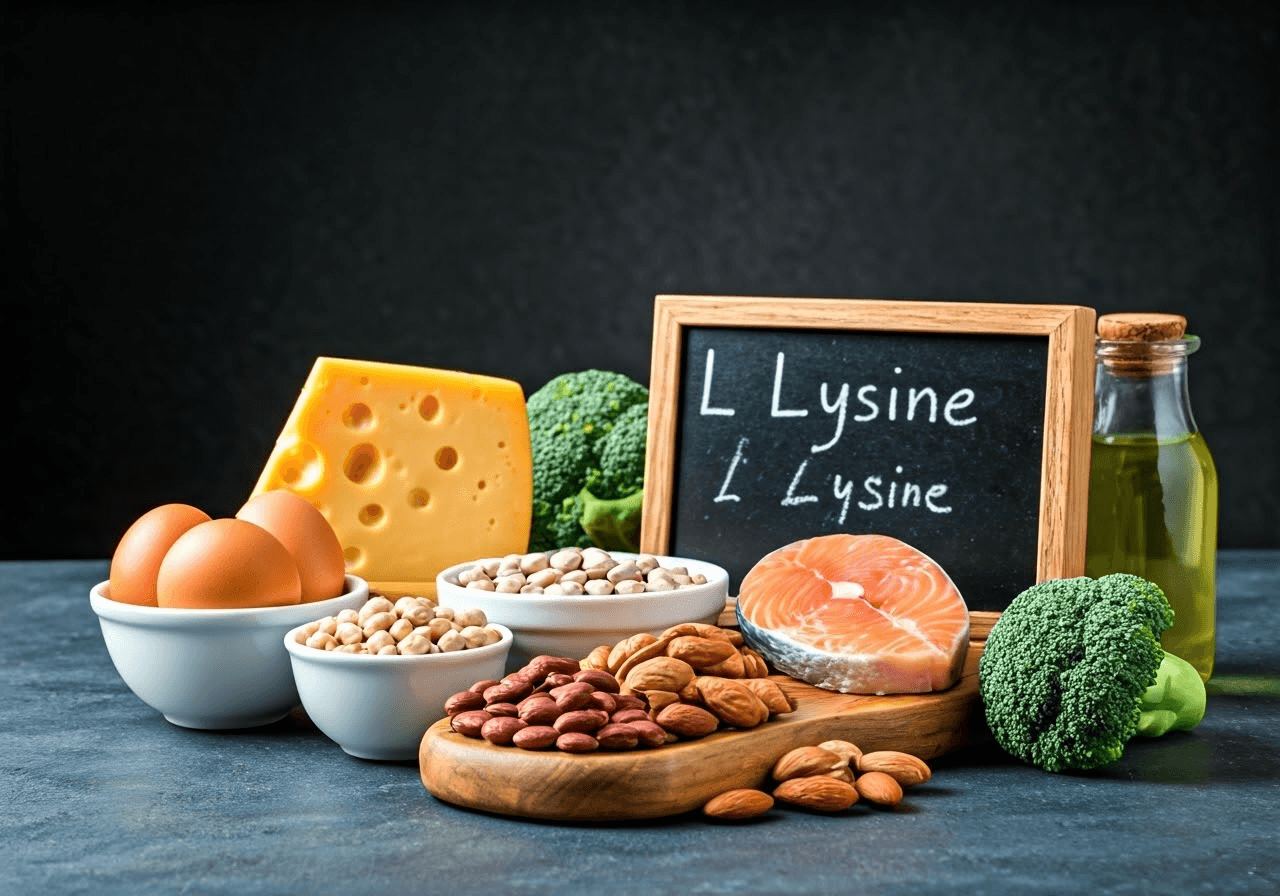
Explore different types of l lysine supplements. You can try hydrochloride, monohydrate, N-acetyl, aspartate, and sucinate. Look for the one that works best for you. Make sure to check the purity, absorption rates, and benefits. This will help you find the most effective option.
L Lysine Hydrochloride (HCl): Common & Absorbable Form
Lysine hydrochloride (HCL) is the most common type of lysine found in supplements. It is popular because it is stable and easy for the body to absorb. This means it can provide good health benefits. Lysine hydrochloride helps in making collagen, improving calcium absorption, and supporting the immune system. If you are thinking about lysine supplementation, this form is a great choice due to its effective results and simple use.
L Lysine Monohydrate: High Purity Supplement
L-lysine monohydrate is known for its high purity compared to other forms of lysine. This essential amino acid is a favorite for anyone looking for quality supplements. With a stronger concentration, l-lysine monohydrate provides great benefits for different health issues. Its purity helps with better absorption and effectiveness in supporting collagen production, healing tissue, and boosting the immune system. Adding l-lysine monohydrate to your daily routine can greatly help your overall health and wellness.
N-Acetyl-L Lysine (NAL): Enhanced Absorption Benefits
N-acetyl-L-lysine (NAL) is thought to be absorbed better because of its acetylated form. This may make it more available for the body. This change could make it work better than other forms of L-lysine.
L Lysine Aspartate & Sucinate: For Energy & Metabolism
These special forms of l lysine, called aspartate and sucinate, provide helpful benefits. Aspartate helps with energy production and metabolism, which is good for cell function. Sucinate helps with the citric acid cycle, an important process for making energy in the body. By adding these forms of l lysine to your dietary supplement routine, you may boost your energy levels and improve your overall health.
Table: L-Lysine Supplement Types Compared
| Type of L-Lysine | Absorption Rate | Key Benefits | Best For | Notes / Considerations |
|---|---|---|---|---|
| L-Lysine Hydrochloride (HCl) | High | Most common, stable, and well-absorbed; supports collagen production, calcium absorption, and immune function | General health, immune support, collagen production | Cost-effective, widely available; usually vegan-friendly, but check capsule ingredients. |
| L-Lysine Monohydrate | Very High | Higher purity, better absorption, and stronger concentration; enhances tissue repair and immune function | Those seeking high-purity supplements for overall wellness | Used in clinical settings; very safe and well-studied, may be pricier. |
| N-Acetyl-L-Lysine (NAL) | Moderate to High | Studied for potential bioavailability and cellular effects; less evidence for mainstream supplementation | Individuals with special metabolic needs or research focus | Rarely sold as a mainstream supplement; not typically for immune/collagen or viral support. |
| L-Lysine Aspartate | Moderate | Supports energy production and metabolism; may improve cell function | People with high energy demands (e.g., athletes) | Found in amino acid blends for athletes; less data for general use. |
| L-Lysine Sucinate | Moderate | Involved in the citric acid cycle, aiding energy production | Those looking for energy-boosting amino acids | Less common; check product labels for purity and dosage. |
How to Take L Lysine: Dosage, Timing & Absorption Tips
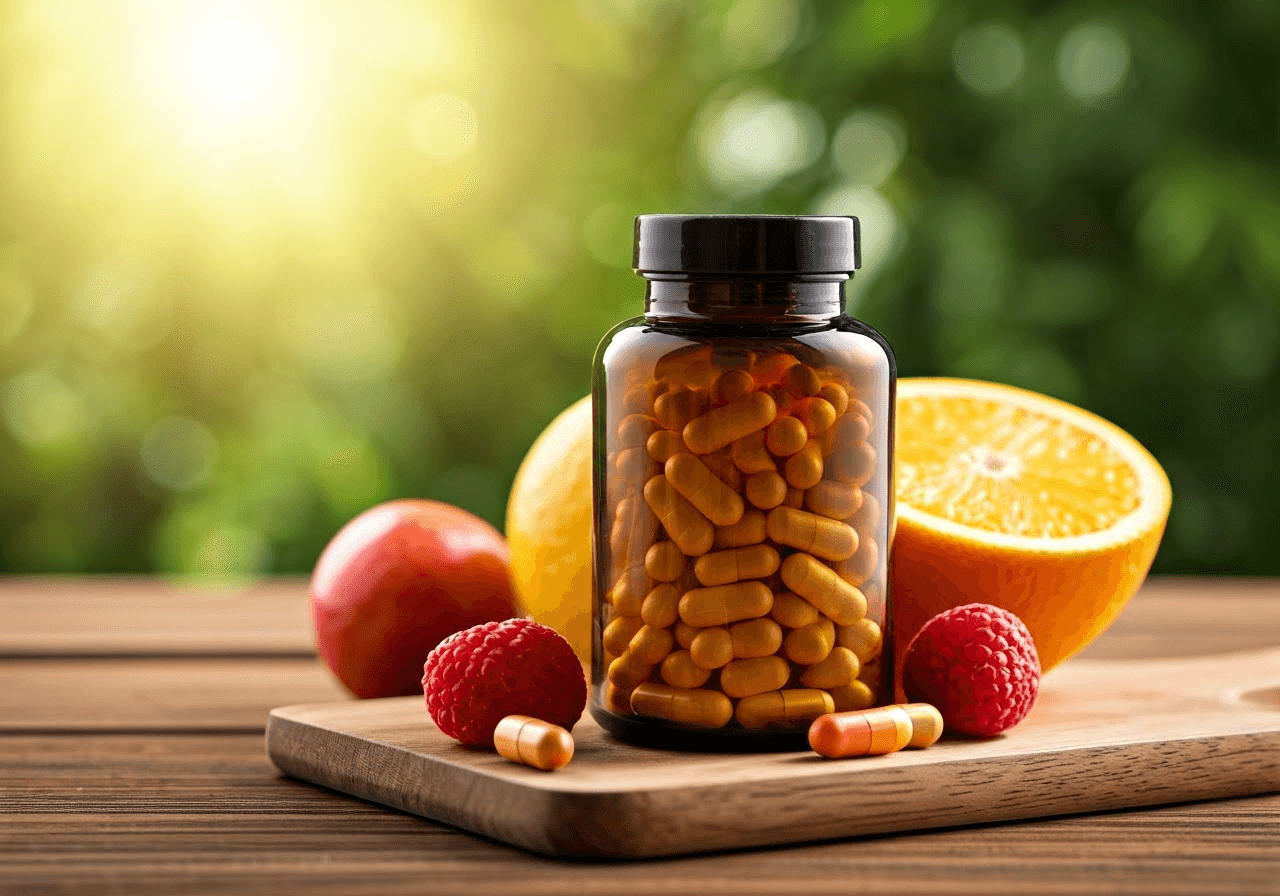
The usual dose of l lysine for adults is between 1,000 mg and 3,000 mg each day, divided into smaller amounts. For treating cold sores, it can go up to 3,000 mg, taken three times a day. You can take l lysine with food or on an empty stomach. It’s best to take it at the same time every day for the best effect. Always talk to a healthcare professional to find the right dose for you.
Recommended Daily L Lysine Intake by Age
The recommended daily intake (RDI) of L-lysine varies depending on age and life stage. For healthy adults, the World Health Organization (WHO) suggests an RDI of 36 mg of lysine per kilogram of body weight or approximately 16 mg per pound.
| Age Group | Recommended L-Lysine Intake(mg/kg body weight/day) | Estimated Avg. Body Weight* | Estimated Total Intake(mg/day) | Notes & Good Food Sources |
|---|---|---|---|---|
| Infants (0–6 mo) | 97–103 | ~7 kg (15 lbs) | ~680–720 | Met via breast milk or formula. |
| Infants (7–12 mo) | 64–89 | ~9 kg (20 lbs) | ~575–800 | Introduce lysine-rich foods: yogurt, pureed meats, beans. |
| Children (1–3 yr) | 60–69 | ~13 kg (29 lbs) | ~780–900 | Growth phase; ensure varied protein sources: meat, fish, dairy, eggs, legumes, quinoa. |
| Children (4–8 yr) | 44–58 | ~22 kg (48 lbs) | ~970–1,275 | Add seeds, soy products; monitor picky eaters. |
| Children (9–13 yr) | 44–47 | ~35 kg (77 lbs) | ~1,540–1,650 | Mix animal and plant proteins for best intake. |
| Adolescents (14–18) | 41–44 | ~55 kg (121 lbs) | ~2,255–2,420 | Needs increase during puberty; add nuts, seeds, soy. |
| Adults (19+ yr) | 36–38 | ~70 kg (154 lbs) | ~2,520–2,660 | Meat, fish, eggs, dairy, soybeans, pumpkin seeds, quinoa. |
| Pregnancy | ~40–51 | ~70 kg (154 lbs)** | ~2,800–3,570 | Higher needs for fetal growth; consult healthcare provider. |
| Lactation | ~43–52 | ~70 kg (154 lbs)** | ~3,010–3,640 | Higher needs for milk production; consult healthcare provider. |
* Estimated average body weight per CDC/WHO reference charts.<br>
** For pregnancy and lactation, actual needs depend on maternal body weight and individual circumstances.
It’s important to note that these are general recommendations. If you have any health concerns or are pregnant or breastfeeding, consult with your healthcare provider to determine the appropriate L-lysine intake for your individual needs.
Best Time to Take L Lysine for Maximum Effect
The best time to take L Lysine is usually when your stomach is empty or between meals. This helps your body absorb it better. However, it’s important to talk to a healthcare provider for advice based on your health needs and any other medications or supplements you might take.
L Lysine Absorption Tips: How to Improve Uptake
To get the most from your lysine supplementation, keep these absorption tips in mind:
Take with Vitamin C: Vitamin C helps your body absorb lysine better. You can take your lysine with a source of vitamin C, like a glass of orange juice or a vitamin C supplement, to improve its effectiveness.
Consider Zinc: Zinc and lysine work well together. Taking lysine with a zinc supplement or eating zinc-rich foods while taking your lysine may help in better absorption and use of the supplement.
Stay Hydrated: Drinking lots of water every day helps overall nutrient absorption. It can also support your body in using lysine better.
Keep in mind that these tips are general. Different people may react differently to lysine supplementation. It’s smart to talk with a healthcare professional or a registered dietitian to tailor your approach to your specific needs and health goals.
Here are some simple but effective ways to improve how well your body absorbs L-lysine:
| Tip / Factor | Mechanism / How It Helps | Practical Application / Examples |
|---|---|---|
| Vitamin C | Enhances lysine absorption in the body. | Take lysine with a source of vitamin C: – Glass of orange juice – Bell peppers, broccoli, berries – Vitamin C supplement |
| Zinc | Works synergistically with lysine; may improve absorption and use. | Take lysine with zinc: – Zinc supplement (if recommended) – Zinc-rich foods: oysters, meat, beans, nuts, seeds |
| Hydration | Supports overall nutrient absorption and bodily functions. | Drink plenty of water daily, especially when taking supplements |
| Calcium | High doses may compete with lysine for absorption in the gut. | Avoid taking large doses of calcium and lysine at the same time (space them out by several hours if possible) |
| Arginine | Competes with lysine for absorption and cellular uptake. | Limit high-dose arginine supplements if you are using lysine for viral support (cold sores, herpes, etc.) |
| Personalization | Individual responses to supplements can vary. | Consult a healthcare provider or dietitian for personalized advice |
L Lysine Deficiency: Symptoms, Causes & Who’s at Risk
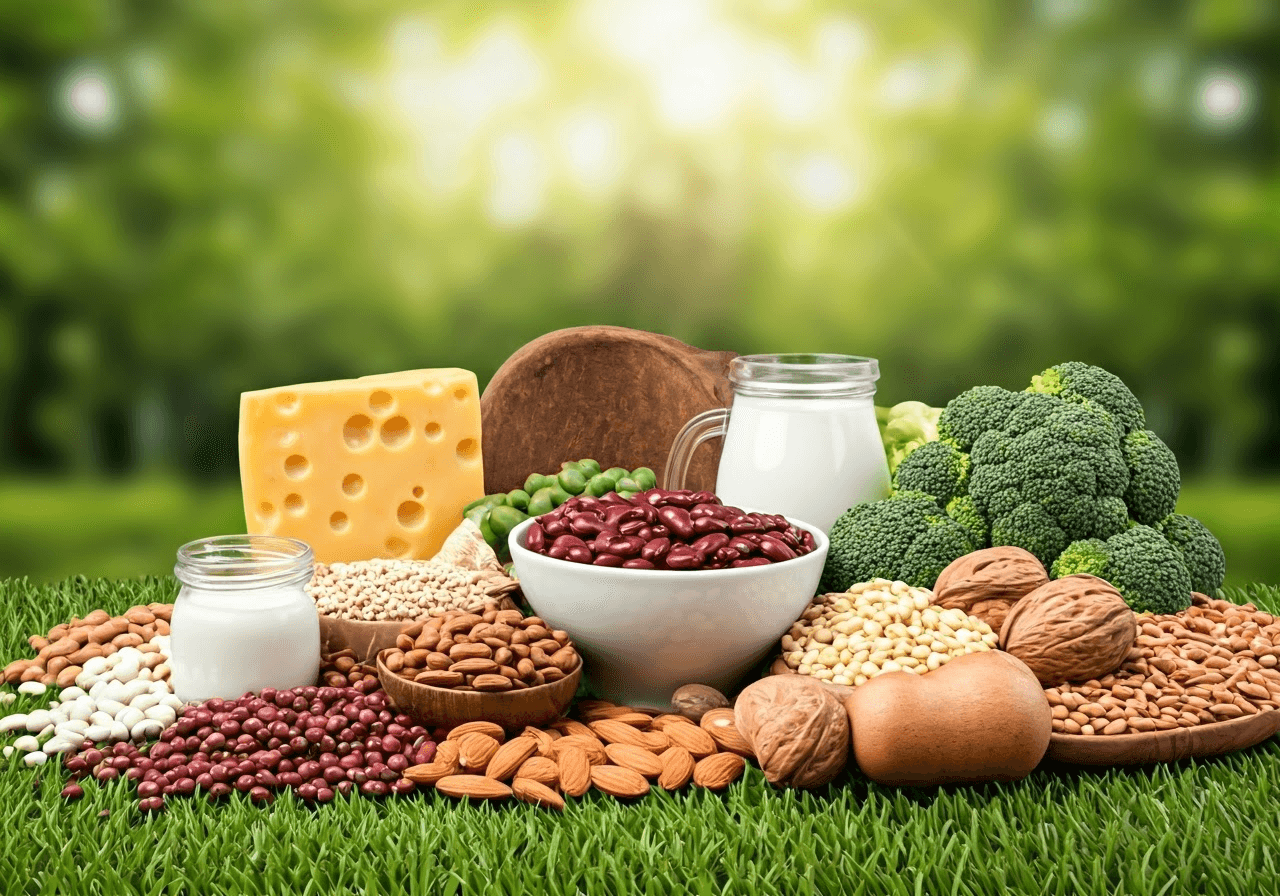
The blog title is about the benefits of L-lysine. Not having enough can lead to tiredness, focus issues, and slow growth. This can impact vegetarians, athletes, and those with low protein intake. Signs may include anemia, hair loss, or reproductive problems due to insufficient amino acids. Risk factors are stress, infections, or post-surgery recovery. In these situations, the body requires more L-lysine. Consuming lysine-rich foods or supplements can alleviate symptoms and promote health.
Who’s at Risk of L Lysine Deficiency?
Lysine shortage is rare but can occur due to diet. Restrictive diets, low in animal products, may lack lysine. Vegans and some vegetarians must monitor lysine intake by consuming plant-based foods like legumes, nuts, and seeds. Those with digestive problems, such as celiac disease or Crohn’s disease, may struggle to absorb nutrients properly, leading to a potential lysine deficiency.
Below are the key groups most at risk of lysine deficiency and why they may require extra attention to their dietary intake.
| Risk Group | Reason for Increased Risk | Example Considerations / Notes |
|---|---|---|
| Vegans & Vegetarians | Lower intake of animal proteins, the main source of lysine | Must emphasize beans, lentils, soy foods, seeds, and nuts |
| People on Restrictive, Low-Protein, or Low-Calorie Diets | May not meet daily protein or essential amino acid needs | Fad diets, unbalanced meal plans, crash diets, eating disorders |
| Individuals with Digestive Disorders | Impaired nutrient absorption (e.g., celiac disease, Crohn’s, IBS, chronic diarrhea) | May need medical guidance; risk of multiple deficiencies |
| Growing Children & Teens | Increased needs for growth and development | Monitor picky eaters, plant-based or low-protein diets |
| Athletes & Highly Active Individuals | Higher demand for amino acids due to muscle repair and recovery | Especially if diet is mostly plant-based or low in protein |
| Pregnant & Breastfeeding Women | Increased needs for fetal growth and milk production | Consult healthcare provider to ensure adequate lysine intake |
| Older Adults / Elderly | Reduced appetite, absorption issues, or dietary restrictions | May need dietary adjustments or supplementation |
| People Recovering from Illness/Surgery | Increased protein needs for wound healing and tissue repair | Temporary higher risk; extra dietary support may help |
Symptoms of L Lysine Deficiency
Lysine lack can have different effects as it supports many body functions. Recognizing signs is crucial. It helps in addressing the deficiency through dietary changes or supplements. One common indicator is hair loss. Lysine aids collagen production for healthy hair growth. Insufficient lysine can decrease energy levels by hindering carnitine creation to convert fat into energy. Moreover, low lysine levels impact enzyme production, disrupting chemical reactions and potentially causing health problems in the long term.
If the body doesn’t get enough lysine, it may show through several physical and mental symptoms. The table below highlights key signs to watch for and their possible impacts.
| Symptom / Sign | How It Manifests / Why It Happens | Potential Impact / Notes |
|---|---|---|
| Hair Loss / Thinning Hair | Lysine is vital for collagen production, which strengthens hair follicles. | Hair may become brittle, weak, or shed more easily. |
| Fatigue & Low Energy | Needed for carnitine synthesis to convert fatty acids to energy. | Persistent tiredness, low stamina, reduced physical performance. |
| Slow / Poor Wound Healing | Collagen, dependent on lysine, is crucial for skin and tissue repair. | Cuts/bruises heal slowly; higher risk of chronic wounds. |
| Anemia | Severe/prolonged deficiency affects red blood cell production and iron use. | Weakness, pale skin, shortness of breath. |
| Weakened Immunity | Important for antibody production and immune cell function. | More frequent infections or longer recovery. |
| Loss of Appetite | Amino acid imbalance can disrupt appetite regulation, especially in kids/elderly. | Can worsen nutrition, especially in children. |
| Dizziness / Nausea | May result from general amino acid imbalance. | Nonspecific, may occur with other nutrient deficits. |
| Reproductive Issues | Severe deficiency may disrupt hormone production and fertility (esp. in women). | Irregular menstruation, fertility problems. |
| Muscle Loss / Weakness | Needed for muscle protein synthesis and maintenance. | Noticeable muscle wasting or soreness. |
| Impaired Enzyme Function | Lysine builds many enzymes for vital body reactions. | Can affect various metabolic processes. |
| Stunted Growth (Children) | Essential for building new tissue during growth phases. | Delayed growth or development in kids and teens. |
| Irritability / Mood Changes | Affects neurotransmitter balance and mental health. | Anxiety, agitation, poor concentration (“brain fog”). |
| Poor Concentration / “Brain Fog” | Impacts neurotransmitter synthesis and cognitive function. | Trouble focusing, memory lapses, mental cloudiness. |
How to Fix & Prevent L Lysine Deficiency
To fix a lack of lysine, you should add more lysine-rich foods to your meals. Good options include lean meats, fish, eggs, legumes, and dairy products. You might also think about taking lysine supplements to help meet your daily needs. It’s very important to talk to a healthcare professional before you start any supplement plan. By balancing your intake of lysine through these foods and supplements, you can solve any lysine deficiency effectively.
Here are key ways to fix and prevent lysine deficiency effectively:
| Strategy / Method | How It Helps | Practical Application / Examples |
|---|---|---|
| Increase Dietary Intake | Provides more lysine through food, the most natural and bioavailable source | Eat more lean meats, fish, dairy, eggs, beans, lentils, tofu, tempeh, quinoa |
| Emphasize Plant Proteins | Essential for vegans/vegetarians to meet lysine needs without animal foods | Add legumes (lentils, chickpeas), soy foods (tofu, tempeh, edamame), quinoa, seeds, nuts |
| Choose Complete Proteins | Ensures all essential amino acids, including lysine, are consumed | Combine grains with legumes (e.g., rice + beans); include soy or quinoa regularly |
| Consider Supplementation | Directly boosts lysine intake, especially if diet is restricted or needs are high | Use L-lysine supplements after consulting with a healthcare provider |
| Address Underlying Issues | Treats causes of malabsorption (digestive disorders, chronic illness, etc.) | Follow medical advice for celiac disease, Crohn’s, IBS; may require nutrition support |
| Monitor Intake During Life Stages | Supports increased needs during growth, pregnancy, breastfeeding, or recovery | Adjust diet or supplements as recommended for these life stages |
| Seek Professional Guidance | Ensures safe and effective correction, tailored to individual needs | Consult a registered dietitian or doctor before major dietary changes or supplements |
L Lysine Side Effects, Interactions & Safety Tips

L-lysine is safe for most adults if used correctly. However, it can have side effects, especially in high doses or with certain health conditions. To use L-lysine safely, know the side effects and follow recommended amounts. Before starting any new supplement, consult your healthcare provider and review the conditions of use, especially if you have health problems or take medications, or if you are pregnant or breastfeeding.
Common L Lysine Side Effects
L-lysine is safe to take but may cause mild side effects at higher doses. , with a recommended daily dose of up to 3 grams. Digestive issues like nausea, diarrhea, and stomach pain are common. These can be avoided by taking lysine with food or reducing the dose. Allergic reactions are rare but may include skin rashes, itching, or trouble breathing. If you have signs of an allergic reaction, stop use immediately and seek medical help. Tolerance to this supplement varies among individuals. Mild side effects usually disappear on their own. Severe or persistent side effects should prompt stopping the supplement and consulting a healthcare provider.
Most people tolerate L-lysine well, but some may experience side effects. See the table below for details.
| Category / Side Effect | Description / Specific Symptoms | Severity / Frequency | Recommended Action / Notes |
|---|---|---|---|
| Digestive Issues | Nausea, stomach pain/cramps, diarrhea, bloating, gas | Mild to Moderate / Relatively common | Take with food, lower dose, split daily dose; stop if severe or persistent. |
| Interaction with Arginine | May reduce lysine’s viral support effectiveness | Uncommon | Avoid high-dose arginine if taking lysine for herpes/cold sores. |
| Headache | Mild tension-type headache | Rare | Usually resolves on its own. |
| Increased Calcium Absorption | No direct symptoms; possible risk for those with high calcium or related conditions | Rare / Uncommon | Consult a doctor if you take high-dose calcium or have a calcium metabolism issue. |
| Allergic Reaction | Rash, itching, hives, swelling (face/lips/throat), difficulty breathing | Mild to Severe / Very rare | Stop immediately; seek emergency help if severe or trouble breathing. |
| Kidney Function Concerns | Potential stress for people with pre-existing kidney disease (no direct symptoms) | Very rare (mainly high/prolonged doses) | Not for use with kidney disease unless doctor-approved; avoid very high/long-term use. |
| Gallstones / Pancreatitis | Abdominal pain after fatty meals, nausea, vomiting (very rare reports) | Very rare / Mostly theoretical/case reports | Those with gallstone/pancreatitis history: consult doctor before use. |
Who Should Not Take L Lysine?
L-lysine is generally safe for adults. However, caution is needed in specific situations. Pregnant and nursing women should avoid L-lysine unless approved by a healthcare provider due to limited safety data. Individuals with kidney or liver issues should consult a healthcare provider before taking L-lysine to prevent any potential negative effects on their condition or medications.
While L-lysine is safe for most, certain individuals should use caution or avoid it altogether.
| Group | Reason for Caution / Contraindication | Notes / Recommendations |
|---|---|---|
| Individuals with Kidney Disease | Lysine may worsen kidney function or accumulate in renal disease | Should only use under doctor’s supervision; avoid high or prolonged doses |
| People with Liver Disorders | Amino acid supplements may burden impaired liver metabolism | Consult a healthcare provider before use |
| Pregnant & Breastfeeding Women | Insufficient data for safety at high supplemental doses | Use only if recommended by a healthcare provider |
| Children (High Doses) | Safety of high doses not established in children | Use only under pediatrician’s guidance |
| People with Known Allergies to Lysine | Risk of allergic reaction (rash, swelling, difficulty breathing) | Avoid entirely; seek alternatives if allergy is confirmed |
| Those with Hypercalcemia | Lysine may increase calcium absorption | Avoid high-dose supplements if you have high blood calcium |
| People Taking Certain Medications | Potential for interactions (e.g., calcium, antibiotics, antivirals, arginine) | Check with a healthcare provider about drug/supplement interactions; most are rare or theoretical |
| Individuals with History of Gallstones | Isolated reports of increased risk with lysine supplements | Consult a doctor if you have a history of gallstones or pancreatitis; evidence is limited but caution is reasonable |
L Lysine Interactions: What to Avoid with Supplements
To avoid problems, do not take l lysine with arginine supplements. This could make l lysine less effective. Also, be careful with calcium supplements because they might block l lysine from being absorbed. Always talk to your healthcare provider before mixing l lysine with other medicines or supplements.
Certain substances and supplements can affect how L-lysine works or is absorbed—here’s what to watch out for.
| Substance / Factor | Severity / Likelihood of Interaction | Interaction / Concern | Notes / Practical Recommendations |
|---|---|---|---|
| Arginine (Supplements) | Moderate to High (if both high dose) | Competes with lysine for absorption and may reduce its effectiveness | Avoid high-dose arginine if taking lysine for viral support (cold sores, herpes) |
| Aminoglycoside Antibiotics (e.g., gentamicin) | Moderate to High (if prolonged/IV use) | Potential increased risk of nephrotoxicity (kidney issues) | Use only under medical supervision if on these medications |
| Calcium (Supplements) | Low to Moderate (mainly high doses) | May compete for absorption in the gut, possibly lowering lysine uptake | Space out lysine and high-dose calcium supplements by several hours |
| Certain Antibiotics (tetracyclines, quinolones) | Low to Moderate | Amino acid supplements may interfere with some antibiotics | Consult your doctor before combining lysine with these prescription antibiotics |
| Other Amino Acid Supplements | Low to Moderate (if high “megadose” use) | Competing amino acids may interfere with lysine’s absorption or use | Avoid unnecessary amino acid “megadoses”; consult a healthcare provider |
| Alcohol (Excessive Use) | Low to Moderate (if heavy/chronic use) | Impairs nutrient (including amino acid) absorption | Minimize alcohol or ensure adequate dietary protein and lysine |
| High-Protein Diets | Low | May increase overall amino acid levels, including lysine | Balance protein intake from various sources |
| Iron Supplements | Low | May use similar absorption pathways | Space lysine and iron supplements apart for best absorption |
| Antiviral Medications (e.g., acyclovir) | Very Low | No adverse interaction; both can be used for herpes simplex | Consult your doctor to coordinate therapy if using both |
| Gallstone or Pancreatitis Risk | Very Low / Theoretical | Some reports suggest lysine may increase risk in susceptible people | If you have gallstones or pancreatitis history, consult your doctor |
| Zinc | Very Low (usually beneficial) | Works synergistically with lysine | Usually safe; may actually improve lysine absorption |
| Dietary Fiber | Very Low | Very high fiber can slightly reduce amino acid absorption | If on a high-fiber diet, separate lysine supplements and fiber-rich meals |
| Medications Affecting Calcium Metabolism | Very Low | Lysine may increase calcium absorption | Monitor calcium levels if on related medications; check with your doctor |
| Corticosteroids | Very Low | May increase lysine requirements over time | Balance overall protein and amino acid intake; consult healthcare provider |
Latest Research on L Lysine: Studies & Scientific Updates
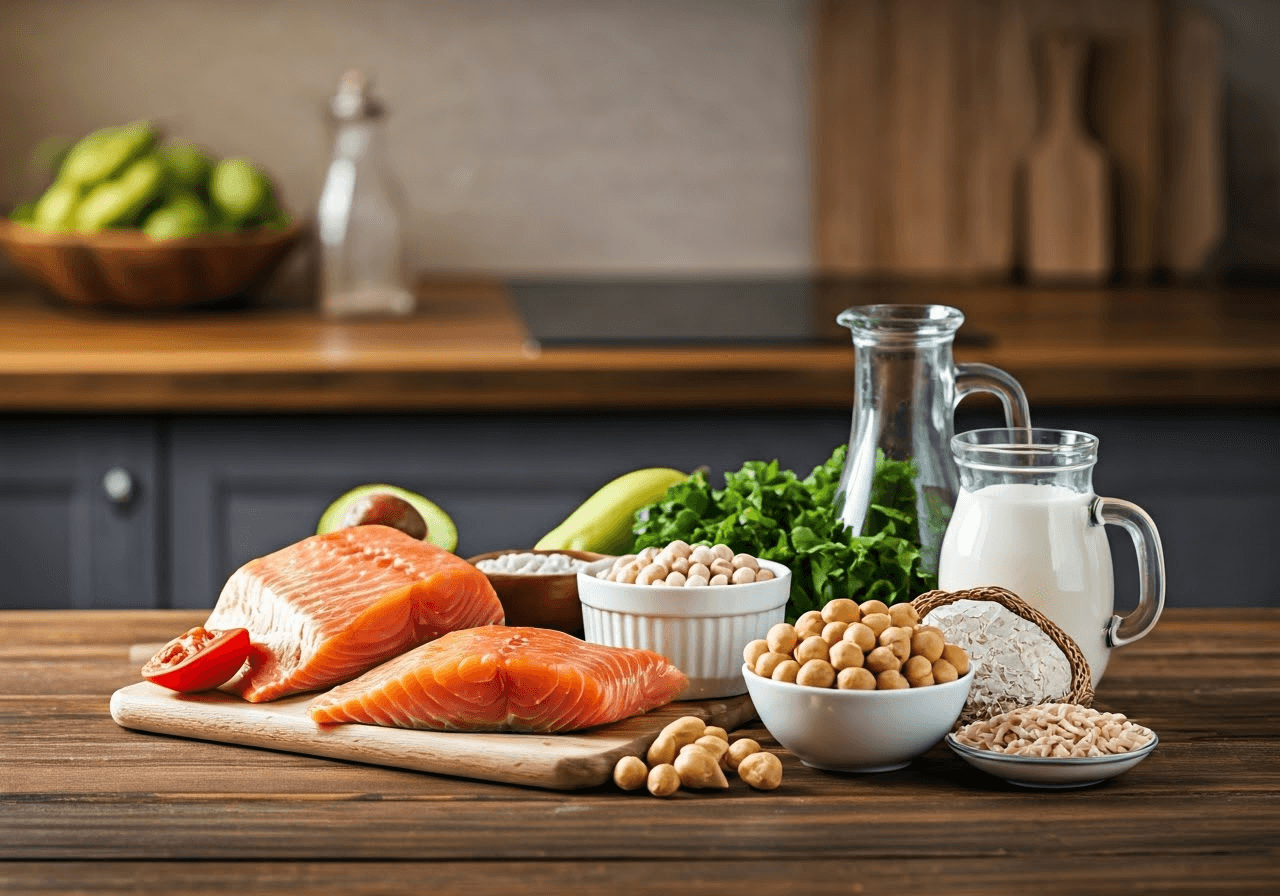
Lysine is being studied for its health benefits. Recent research indicates positive effects in various areas. Studies suggest lysine may support heart function and regulate blood pressure. Lysine might also help in reducing anxiety. More research on lysine supplementation is needed to understand its impact on overall well-being. Keep informed about the latest research on lysine for optimal health benefits.
L Lysine & Cardiovascular Health: Key Studies
Many studies have looked into how l lysine affects heart health. Research indicates that l lysine might help control high blood pressure, which is a major risk for heart disease. Also, l lysine plays a key role in making collagen. This is important for keeping blood vessels healthy and supporting heart function. The studies show good signs that l lysine supplementation could lead to better heart health markers. More research is needed to fully know how l lysine benefits cardiovascular health.
L Lysine for Mental Health & Anxiety: Research Overview
Research shows that l lysine might help support mental health and reduce anxiety. It affects neurotransmitters and brain function, which can aid in managing stress and mood. Some studies hint that l lysine could lessen anxiety symptoms, but more research is needed to really understand how it affects mental health. Eating foods rich in l lysine or taking supplements may be good for your emotional well-being, offering a complete way to handle anxiety and boost mental health.
Conclusion
In conclusion, using L Lysine can greatly improve your health. This essential amino acid supplement helps boost your immune system and supports wound healing and tissue repair. It is important to add natural sources of L Lysine to your meals. You might also think about supplements to help your body absorb it better. Knowing the signs of deficiency and any side effects is key for safe use. Stay informed and healthy! If you want to learn more about L Lysine, check out our FAQ section for more information.
The content on WellwayHub.com is intended for general informational purposes only and should not be taken as medical advice. Please consult your doctor or a qualified health professional before making any changes to your health routine.
Some links on WellwayHub.com may be affiliate links. This means we may earn a small commission if you make a purchase through these links, at no extra cost to you. This helps support our mission to provide trusted wellness content.
Frequently Asked Questions
Taking L lysine every day can be good for your overall health. It is important to talk to a healthcare provider for advice that fits your needs and goals. Being consistent with your daily L lysine intake may help you get the most health benefits from lysine supplementation.
The best time to take L-lysine is on an empty stomach or between meals for optimal absorption. However, if it causes stomach upset, you can take it with food. For consistent results, take it at the same time each day. Always follow your healthcare provider’s dosage recommendations.
Most people can see the benefits of taking L Lysine in a few weeks to a few months, especially if it is taken in a gel form. This can depend on different factors, like how much you take, your health, and how often you use it. Since results can differ from person to person, it is important to be patient and give it time to work.
Symptoms of L-lysine deficiency may include fatigue, hair thinning, poor wound healing, irritability, dizziness, loss of appetite, and weakened immunity. In children, it may cause slow growth. These signs indicate your body might not be getting enough of this essential amino acid.
Taking too many L lysine supplements can cause stomach problems or diarrhea. It is important to stick to the recommended dose to prevent any side effects.
Lysine can help with weight management. It does this by aiding in the absorption of calcium, which is connected to how we burn fat. Lysine also helps produce carnitine. Carnitine is important because it changes fatty acids into energy. Research shows that lysine may have positive effects on weight control.
Lysine helps hair grow by helping the body absorb iron. Iron is very important for healthy hair. Lysine also helps make collagen, which is essential for strong and healthy hair follicles..
Top L-lysine-rich foods for muscle support include chicken breast, lean beef, eggs, Greek yogurt, fish (like tuna and salmon), and legumes such as lentils and black beans. These foods provide high-quality protein, which is essential for muscle repair and growth.
Vegetarians and vegans can get enough L lysine from plant foods. Good sources include legumes, quinoa, and soy products. Eating a mix of these foods in their meals can satisfy their L lysine needs without the need for supplements.
Lysine competes with other amino acids when it comes to absorption and transport. It can also change the levels of arginine in the body, which affects different metabolic processes. Knowing how these interactions work is important for improving the health benefits of lysine.